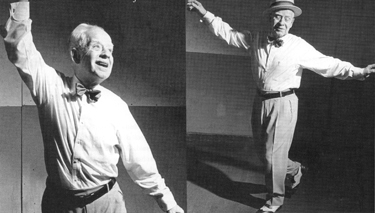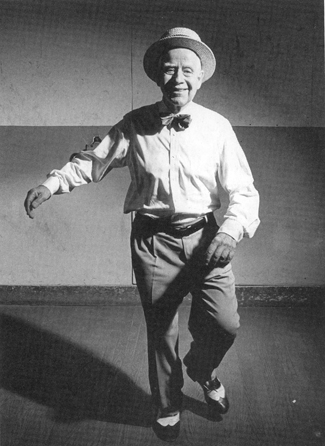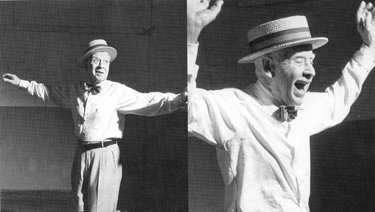At the age of seventy-four, I find myself increasingly preoccupied with thoughts of approaching old age and death. It seems that almost every morning when I scan the obituary page of the New York Times, I find that more than half of those who died the previous day were my age or younger.
I feel lucky in a way. When I go out for my morning run along the shores of the Hudson River, I think of today as an “extra” day, one I did nothing special to deserve and have no reason to expect. But there it is, a gift, not to be wasted.
I’m an actor and cabaret performer, and the thought entered my mind a while back to develop some cabaret material on the theme of old age and death. At first I dismissed the idea as preposterous. Who would want to spend an evening dwelling on the relentless deterioration of our bodies and, if we live long enough, perhaps our minds as well? Who among us is willing to face up to what appears to many of us to be utter and permanent extinction?

Let’s face it, these are not fit subjects for a cabaret show. (In fact, they are perhaps the last remaining taboo subjects in our culture.) In the zendo, of course, contemplating such hard realities can shock us into awakening. But do I have a right to inflict my peculiar Buddhist views on an unsuspecting audience who came to be entertained?
And yet I couldn’t help myself. When I signed on recently for a cabaret workshop which was to culminate with each of us doing a twenty-minute set at Don’t Tell Mama, a nightclub in New York City, the first song I was drawn to was “September Song,” by Kurt Weill and Maxwell Anderson, which includes lines that struck home:
Oh the days dwindle down
To a precious few . . .
September
November . . .
And these few precious days
I’ll spend with you.
These precious days
I’ll spend with you.
Notice that October slips by unawares. And of course we all know what happens in December.
Weill himself died at age fifty of a heart attack. His precious days were few indeed, but my, how he used them! Did he have a presentiment that he would die young? Several years after writing “September Song,” he returned to the theme of how precious life is in “One Life to Live,” this time with lyrics by Ira Gershwin. The song reminds us repeatedly that “each day is numbered, no good when slumbered.”
Doesn’t that sound exactly like the gatha we chant every evening at the zendo:
Life and death are of supreme importance.
Time swiftly passes by and opportunity is lost.
Each of us should strive to awaken . . . awaken.
Take heed: Do not squander your life.
But the song that seems to me to be a complete dharma talk in itself is “Here I’ll Stay,” by Weill and Alan Jay Lerner:
There’s a far land I’m told,
Where I’ll find a field of gold,
But here I’ll stay with you.
And they say there’s an isle deep with clover,
Where your heart wears a smile all day through.
But I know well they’re wrong
And I know where I belong,
And here I’ll stay with you.
For that land is a sandy illusion;
It’s the theme of a dream gone astray,
And the world others woo
I can find loving you,
And so here I’ll stay.
Sobering thoughts indeed. But the last thing I wanted was for my cabaret set to be gloomy or somber. Fortunately, “One Life to Live” is a lighthearted, upbeat number, and I was able to attach to it a tap-dance routine expressing the joy of being alive in this moment. (I’m an avid, if late-blooming, tapper—I took my first lesson at age sixty-five.)

I found other upbeat songs, and I tried to lace my reflections on old age and death with as much humor as possible. Still, as I stood in the wings at Don’t Tell Mama, I was terrified that these people would find my material morbid or repugnant, and I half expected to be tarred and feathered and ridden out of town on a rail.
But to my astonishment, they laughed. They actually laughed and clapped their hands! And there were moments when I felt a deep stillness descend upon the house—always a sure sign that the people out there are listening intently.
I felt their stillness most strongly during my closing number, “My Ship,” by Weill and Ira Gershwin again. I’ve always been deeply moved by that song, but when I began selecting material for my set, I didn’t see how I could possibly include it. It was written to be sung by a young girl on the threshold oflife, dreaming about a happy future—hardly the right material for a septuagenarian contemplating old age and death. This haunting ballad about a ship with sails of silk, glowing with pearls and rubies, coming in to a harbor as the “sun sits high in a sapphire sky,” kept coming to mind again and again. I kept dismissing it as unconnected to my theme. Then one day I finally found what it was trying to say to me.
I live in an apartment with a view of the Hudson River. I love to sit by my window and watch it roll by. Sometimes, when the tide is coming in, you can actually see the currents moving upstream. The Indians called the Hudson “The River that Runs Both Ways.” And I love to sit and watch the tall ships that sail up the Hudson on Independence Day, their masts reaching toward the sky, their white sails billowing out in the breeze, their teak decks reflecting the morning sun. I see the river as a metaphor for our lives: We ebb and flow, ebb and flow, and then we are carried out to merge with the sea. And I see the tall ships as magical vessels, one of which may come some day to pick me up and take me on a long journey—an adventure, really—into uncharted waters.
These images make the prospect of death far less terrifying to me. How heartening it is to find that insights into the way things are can arise not only while sitting on a cushion, but also while singing and tap-dancing to Broadway melodies! My cabaret work, I now find, is not separate from my practice, it is not a commentary about my practice, it is my practice .
♦
Song Lyrics: “Here I’ll Stay,” by Alan Jay Lerner and Kurt Weill, © 1948 (Renewed) Tro-Hampshire House Publishing Corp. and Chappell & Co; “September Song,” by Maxwell Anderson and Kurt Weill, © 1983 (Renewed) Tro-Hampshire House Publishing Corp. and Chappell & Co; Both all rights reserved and used by permission of Warner Bros. publications U.S. Inc., Miami, Fl. 33014
Thank you for subscribing to Tricycle! As a nonprofit, we depend on readers like you to keep Buddhist teachings and practices widely available.
